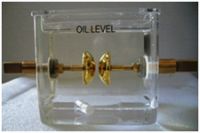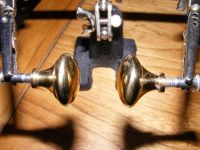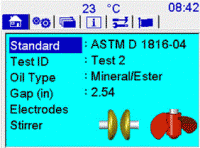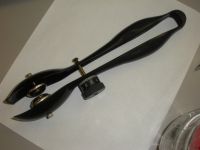
Coconut oil as a dielectric (better than transformer oil)
Ash Small, Sat Aug 08 2015, 10:15PMI wasn't sure whether to post this in HV or here, so, if in doubt.....
I read sometime ago that coconut oil was a better dielectric than transformer oil in an MOD paper.
Today my 'better half' showed me a 'product' she'd bought in Tesco's for £4.99 (she thinks) which the label claims to be 'Extra Virgin 100% Raw Cold Pressed Coconut Oil' (ingredients: organic extra virgin coconut oil).
It contains 250ml. I plan to try it for insulation at some point. I should probably boil it for a while first.
Apparently, coconut oil has a dielectric constant of 2.9 where as transformer oil has a dielectric constant of 2.1:

Re: Coconut oil as a dielectric (better than transformer oil)
klugesmith, Sun Aug 09 2015, 04:38AM
Maybe it's time for you to make a dielectric oil breakdown-test cell and get out a NST. Some oil testing standards call for a stirrer.

klugesmith, Sun Aug 09 2015, 04:38AM
Maybe it's time for you to make a dielectric oil breakdown-test cell and get out a NST. Some oil testing standards call for a stirrer.

Re: Coconut oil as a dielectric (better than transformer oil)
Conundrum, Sun Aug 09 2015, 06:48AM
Yeah, try it and post your results.
Baby oil is rumored to also work if purified and dried under a moderate vacuum.
Conundrum, Sun Aug 09 2015, 06:48AM
Yeah, try it and post your results.
Baby oil is rumored to also work if purified and dried under a moderate vacuum.
Re: Coconut oil as a dielectric (better than transformer oil)
Mads Barnkob, Mon Aug 10 2015, 12:57PM
There is properly some other properties with transformer oil like notasflameable as insert_generic_oil_name or the willnotoutgassomethinghighlyexplosive_factor is different.
I can confirm that baby oil is excellent for a back rub.
Mads Barnkob, Mon Aug 10 2015, 12:57PM
There is properly some other properties with transformer oil like notasflameable as insert_generic_oil_name or the willnotoutgassomethinghighlyexplosive_factor is different.
I can confirm that baby oil is excellent for a back rub.
Re: Coconut oil as a dielectric (better than transformer oil)
2Spoons, Tue Aug 18 2015, 12:18AM
Here's a paper worth looking at. Looks like drying the oil is very important. You might also consider castor oil, though that is more appropriate for capacitors, having a dielectric constant of about 4.7 and a dielectric strength of about 65kV/mm.
]coconut_oil_eru_2001.pdf[/file]
2Spoons, Tue Aug 18 2015, 12:18AM
Here's a paper worth looking at. Looks like drying the oil is very important. You might also consider castor oil, though that is more appropriate for capacitors, having a dielectric constant of about 4.7 and a dielectric strength of about 65kV/mm.
]coconut_oil_eru_2001.pdf[/file]
Re: Coconut oil as a dielectric (better than transformer oil)
Ash Small, Sat Aug 29 2015, 10:57PM
Sorry I've not responded sooner, I've been away camping in the nether regions of North Cornwall, somewhere between Morwenstow (GCHQ Bude) and Tintagel. Mobile internet connections don't seem to have arrived in that part of the world yet
That's an excellent idea Rich. I was planning on building a test rig for 'hand rolled' capacitors so adding a bit of extra functionality can only be a bonus. I already bought these to use as a safety gap for the capacitor tester:-

Thanks for the interesting link, 2Spoons.
Ash Small, Sat Aug 29 2015, 10:57PM
klugesmith wrote ...
Maybe it's time for you to make a dielectric oil breakdown-test cell and get out a NST. Some oil testing standards call for a stirrer.

Maybe it's time for you to make a dielectric oil breakdown-test cell and get out a NST. Some oil testing standards call for a stirrer.

Sorry I've not responded sooner, I've been away camping in the nether regions of North Cornwall, somewhere between Morwenstow (GCHQ Bude) and Tintagel. Mobile internet connections don't seem to have arrived in that part of the world yet

That's an excellent idea Rich. I was planning on building a test rig for 'hand rolled' capacitors so adding a bit of extra functionality can only be a bonus. I already bought these to use as a safety gap for the capacitor tester:-

Thanks for the interesting link, 2Spoons.
Re: Coconut oil as a dielectric (better than transformer oil)
klugesmith, Tue Sept 01 2015, 10:49PM
Looks good, Ash. How was the weather on your camping trip?
I, too, have bought cabinet knobs for this purpose. Maybe it's time to start a thread about oil testers instead of oils. I wonder how special an oil needs to be, to withstand prolonged application of 15 kV RMS from a NST across a 1 mm gap?
What follows, except for the final paragraph and image, went up on another forum a couple weeks ago.
For numerical results to correlate with other labs and product data, it would be good to mimic the popular standards ASTM D1816 and IEC 60156. At least where it's easy and inexpensive.
Here are one summary of those standards, , and one commercial tester UI image:
, and one commercial tester UI image:

The Internet teaches that both standards include polished electrodes with 25 mm radius of curvature. Gap widths are 1 mm, 2 mm, and 2.54 mm. When oil stirring is called for, the impeller shall have standard dimensions and turn at 200 - 300 RPM. One standard also allows a magnetic stirring bar at the bottom of the oil cup.
Are any readers here in a position to access either of the actual standard documents, and answer a few questions about details? Legitimate copies cost about $40 to download. That helps to fund development, maintenance, and distribution of standards. I found some free sources that require registration and/or installing a special reader, and probably also install unwanted junkware and startware or worse.
The smallest model boat propeller available at one hobby shop is about 20 mm wide and has the right number of blades. Neither its package, nor its maker's website, give any specs except a list of the RC boats that it fits. After fruitless Internet searches, physical measurement and test fitting taught me that the nyloc nut has a 1-72 right-hand thread.

This morning, following Ash's lead, I actually put some parts together for fun. Started with disposable plastic tongs for serving salad. They better be oil-resistant! Let's make some sparks under oil. Automatic spark detection and shutdown of the HV can wait.
Let's make some sparks under oil. Automatic spark detection and shutdown of the HV can wait.

klugesmith, Tue Sept 01 2015, 10:49PM
Looks good, Ash. How was the weather on your camping trip?
I, too, have bought cabinet knobs for this purpose. Maybe it's time to start a thread about oil testers instead of oils. I wonder how special an oil needs to be, to withstand prolonged application of 15 kV RMS from a NST across a 1 mm gap?
What follows, except for the final paragraph and image, went up on another forum a couple weeks ago.
For numerical results to correlate with other labs and product data, it would be good to mimic the popular standards ASTM D1816 and IEC 60156. At least where it's easy and inexpensive.
Here are one summary of those standards,
 , and one commercial tester UI image:
, and one commercial tester UI image: 
The Internet teaches that both standards include polished electrodes with 25 mm radius of curvature. Gap widths are 1 mm, 2 mm, and 2.54 mm. When oil stirring is called for, the impeller shall have standard dimensions and turn at 200 - 300 RPM. One standard also allows a magnetic stirring bar at the bottom of the oil cup.
Are any readers here in a position to access either of the actual standard documents, and answer a few questions about details? Legitimate copies cost about $40 to download. That helps to fund development, maintenance, and distribution of standards. I found some free sources that require registration and/or installing a special reader, and probably also install unwanted junkware and startware or worse.
The smallest model boat propeller available at one hobby shop is about 20 mm wide and has the right number of blades. Neither its package, nor its maker's website, give any specs except a list of the RC boats that it fits. After fruitless Internet searches, physical measurement and test fitting taught me that the nyloc nut has a 1-72 right-hand thread.

This morning, following Ash's lead, I actually put some parts together for fun. Started with disposable plastic tongs for serving salad. They better be oil-resistant!
 Let's make some sparks under oil. Automatic spark detection and shutdown of the HV can wait.
Let's make some sparks under oil. Automatic spark detection and shutdown of the HV can wait.
Re: Coconut oil as a dielectric (better than transformer oil)
Ash Small, Wed Sept 02 2015, 10:11AM
We had every type of weather you can imagine except snow, I think, we certainly got our money's worth We even had the air sea rescue helicopter plucking surfers from the rocks and returning them to tne beach, but due to a 'fake' 128Gb micro SD card I bought the week before only actually having 8Gb of memory, I've 'lost' all the photo's I took. (Moral: Don't buy cheap SD cards from Ebay).
We even had the air sea rescue helicopter plucking surfers from the rocks and returning them to tne beach, but due to a 'fake' 128Gb micro SD card I bought the week before only actually having 8Gb of memory, I've 'lost' all the photo's I took. (Moral: Don't buy cheap SD cards from Ebay).
Anyway, back to the topic in question, I've also been giving this some thought. I want a test rig to test capacitors and dielectrics, and also to test various types of DC flyback based circuits. I'm guessing I'll need some sort of HV resistive divider in order to measure the voltages using standard meters, 'scopes, etc.
My initial plan was to construct something out of wood and copper tubing along the lines of classic 'museum' pieces however plastics are cheap and easy to use. I like your 'salad tongs' idea, but you still need to connect the wires to the cabinet knobs, and I'm still considering alternatives.
I want to get the design right before I build it so it's as versatile as possible. Can I add any additional functionality? I certainly want to include provision for a second 'safety gap' if required, for example.
The voltage divider also requires some thought, especially integrating it into the setup in the most convenient manner. (1,000:1 or 10,000:1, for example?....I want to measure to a theoretical 50kV, so want to design for at least twice that. 100kV sounds like a good start for design purposes))
Maybe I should just change the title of this thread, and maybe edit it so that it can be transferred to the 'projects' section at a later date?
EDIT: Found this on Wikipedia:-
Transformer oil testing procedure
To assess the insulating property of dielectric transformer oil, a sample of the transformer oil is taken and its breakdown voltage is measured.
The transformer oil is filled in the vessel of the testing device. Two standard-compliant test electrodes with a typical clearance of 2.5 mm are surrounded by the dielectric oil.
A test voltage is applied to the electrodes and is continuously increased up to the breakdown voltage with a constant, standard-compliant slew rate of e.g. 2 kV/s.
At a certain voltage level breakdown occurs in an electric arc, leading to a collapse of the test voltage.
An instant after ignition of the arc, the test voltage is switched off automatically by the testing device. Ultra fast switch off is highly desirable, as the carbonisation due to the electric arc must be limited to keep the additional pollution as low as possible.
The transformer oil testing device measures and reports the root mean square value of the breakdown voltage.
After the transformer oil test is completed, the insulation oil is stirred automatically and the test sequence is performed repeatedly. (Typically 5 Repetitions, depending on the standard)
As a result the breakdown voltage is calculated as mean value of the individual measurements.
Conclusion: The lower the resulting breakdown voltage, the poorer the quality of the transformer oil!"
I also read that the standard radius of the electrodes should be 25mm. (~2" Dia)
Ash Small, Wed Sept 02 2015, 10:11AM
We had every type of weather you can imagine except snow, I think, we certainly got our money's worth
 We even had the air sea rescue helicopter plucking surfers from the rocks and returning them to tne beach, but due to a 'fake' 128Gb micro SD card I bought the week before only actually having 8Gb of memory, I've 'lost' all the photo's I took. (Moral: Don't buy cheap SD cards from Ebay).
We even had the air sea rescue helicopter plucking surfers from the rocks and returning them to tne beach, but due to a 'fake' 128Gb micro SD card I bought the week before only actually having 8Gb of memory, I've 'lost' all the photo's I took. (Moral: Don't buy cheap SD cards from Ebay).Anyway, back to the topic in question, I've also been giving this some thought. I want a test rig to test capacitors and dielectrics, and also to test various types of DC flyback based circuits. I'm guessing I'll need some sort of HV resistive divider in order to measure the voltages using standard meters, 'scopes, etc.
My initial plan was to construct something out of wood and copper tubing along the lines of classic 'museum' pieces however plastics are cheap and easy to use. I like your 'salad tongs' idea, but you still need to connect the wires to the cabinet knobs, and I'm still considering alternatives.
I want to get the design right before I build it so it's as versatile as possible. Can I add any additional functionality? I certainly want to include provision for a second 'safety gap' if required, for example.
The voltage divider also requires some thought, especially integrating it into the setup in the most convenient manner. (1,000:1 or 10,000:1, for example?....I want to measure to a theoretical 50kV, so want to design for at least twice that. 100kV sounds like a good start for design purposes))
Maybe I should just change the title of this thread, and maybe edit it so that it can be transferred to the 'projects' section at a later date?
EDIT: Found this on Wikipedia:-
Transformer oil testing procedure
To assess the insulating property of dielectric transformer oil, a sample of the transformer oil is taken and its breakdown voltage is measured.
The transformer oil is filled in the vessel of the testing device. Two standard-compliant test electrodes with a typical clearance of 2.5 mm are surrounded by the dielectric oil.
A test voltage is applied to the electrodes and is continuously increased up to the breakdown voltage with a constant, standard-compliant slew rate of e.g. 2 kV/s.
At a certain voltage level breakdown occurs in an electric arc, leading to a collapse of the test voltage.
An instant after ignition of the arc, the test voltage is switched off automatically by the testing device. Ultra fast switch off is highly desirable, as the carbonisation due to the electric arc must be limited to keep the additional pollution as low as possible.
The transformer oil testing device measures and reports the root mean square value of the breakdown voltage.
After the transformer oil test is completed, the insulation oil is stirred automatically and the test sequence is performed repeatedly. (Typically 5 Repetitions, depending on the standard)
As a result the breakdown voltage is calculated as mean value of the individual measurements.
Conclusion: The lower the resulting breakdown voltage, the poorer the quality of the transformer oil!"
I also read that the standard radius of the electrodes should be 25mm. (~2" Dia)
Re: Coconut oil as a dielectric (better than transformer oil)
Ash Small, Fri Sept 04 2015, 03:16PM
I've given this a bit more thought, and found a local supplier of 8mm (5/16th") copper tubing, which I currently plan to use. I can paint it with polyurethane enamel and bake it on to provide some extra resistance to corona, and, if necessary, add more insulation easily if required.
I also want to design in a method of shorting the electrodes with a 'crowbar' on a chicken stick, which will be retained in place by neodymium magnets.
I've also designed a 'hinged shelf' to support the flask containing the oil to be tested.
I've a few ideas regarding gap adjustment. I'm still thinking through the alternatives, but plan to draw something soon
Ash Small, Fri Sept 04 2015, 03:16PM
I've given this a bit more thought, and found a local supplier of 8mm (5/16th") copper tubing, which I currently plan to use. I can paint it with polyurethane enamel and bake it on to provide some extra resistance to corona, and, if necessary, add more insulation easily if required.
I also want to design in a method of shorting the electrodes with a 'crowbar' on a chicken stick, which will be retained in place by neodymium magnets.
I've also designed a 'hinged shelf' to support the flask containing the oil to be tested.
I've a few ideas regarding gap adjustment. I'm still thinking through the alternatives, but plan to draw something soon

Re: Coconut oil as a dielectric (better than transformer oil)
Signification, Sun Sept 06 2015, 06:21AM
@kludge;
I have really been wanting to build some of these things. Including the oil-based tester--thanks for the standards. The prop reminds me of what I consider to be the most unusual patents of Nikola Tesla. He describes a water fountain powered by an AC motor generating resonant whirlpool section-overflows of water. Finally, he illuminates the water with a radioactive substance!
Fast forward to 'today': underwater pumps and ultra-bright rainbow LED's that can fill sections of swirling laminar texture water with Arduino controlled LED- flow which burst out into colors when the laminar surface breaks!
If you are familiar with Tesla's patents, they, as a rule, relate to HF AC and resonance apps. The title of this patent "Fountain" no. 1,113,716 10/13/1914.
I have the bulk of this built (1999), the only problem--the trolling prop won't quite reach the inner edges of the giant PVC wall--critical for thrust!
Signification, Sun Sept 06 2015, 06:21AM
@kludge;
I have really been wanting to build some of these things. Including the oil-based tester--thanks for the standards. The prop reminds me of what I consider to be the most unusual patents of Nikola Tesla. He describes a water fountain powered by an AC motor generating resonant whirlpool section-overflows of water. Finally, he illuminates the water with a radioactive substance!
Fast forward to 'today': underwater pumps and ultra-bright rainbow LED's that can fill sections of swirling laminar texture water with Arduino controlled LED- flow which burst out into colors when the laminar surface breaks!
If you are familiar with Tesla's patents, they, as a rule, relate to HF AC and resonance apps. The title of this patent "Fountain" no. 1,113,716 10/13/1914.
I have the bulk of this built (1999), the only problem--the trolling prop won't quite reach the inner edges of the giant PVC wall--critical for thrust!
Re: Coconut oil as a dielectric (better than transformer oil)
Bored Chemist, Wed Sept 30 2015, 04:05PM
In cool, or cold, weather, coconut oil is a solid. That might make life interesting for you if you are using it as an insulator as the impurities will concentrate between the crystals as it freezes, potentially giving rise to easy breakdown.
Bored Chemist, Wed Sept 30 2015, 04:05PM
In cool, or cold, weather, coconut oil is a solid. That might make life interesting for you if you are using it as an insulator as the impurities will concentrate between the crystals as it freezes, potentially giving rise to easy breakdown.
Re: Coconut oil as a dielectric (better than transformer oil)
Ash Small, Thu Oct 01 2015, 04:00PM
Yes.
A lot of the impurities can be removed by distillation, I think (some details in a paper lined to above) but it reduces the volume considerably. (actually I seem to remember something in the paper about decanting while cooling, and leaving the solid residue behind, I'll need to read it again to refresh my memory)
In any 'real' 4HV scenario it will probably be pretty hot, though (certainly well above the 23C or whatever melting point)
This 'may' involve warming the whole thing prior to use in cold weather, no big deal really, especially if you want it circulating for cooling anyway.
Hoping to make some more progress on this, and other projects, soon, I'm a bit distracted by other 'chores' at the moment.
Ash Small, Thu Oct 01 2015, 04:00PM
Bored Chemist wrote ...
In cool, or cold, weather, coconut oil is a solid. That might make life interesting for you if you are using it as an insulator as the impurities will concentrate between the crystals as it freezes, potentially giving rise to easy breakdown.
In cool, or cold, weather, coconut oil is a solid. That might make life interesting for you if you are using it as an insulator as the impurities will concentrate between the crystals as it freezes, potentially giving rise to easy breakdown.
Yes.
A lot of the impurities can be removed by distillation, I think (some details in a paper lined to above) but it reduces the volume considerably. (actually I seem to remember something in the paper about decanting while cooling, and leaving the solid residue behind, I'll need to read it again to refresh my memory)
In any 'real' 4HV scenario it will probably be pretty hot, though (certainly well above the 23C or whatever melting point)

This 'may' involve warming the whole thing prior to use in cold weather, no big deal really, especially if you want it circulating for cooling anyway.
Hoping to make some more progress on this, and other projects, soon, I'm a bit distracted by other 'chores' at the moment.
Re: Coconut oil as a dielectric (better than transformer oil)
radiotech, Tue Oct 06 2015, 01:44PM
There is another consideration for transformer oils that may be discussed in the Chemistry
forum. If they are subject to a rapid change of temperature, as can be the case in a high energy
arc, will they decompose explosively?
Years ago, there was a paper by IEEE examining the use of certain insulation in metal-clad
switchgear, that had suffered damage while clearing a fault. The damage was in excess of what
the fault energy could have done. Tests revealed that the phase arc barriers, made of a
combustible material, with good strength and insulating properties, had simply detonated.
It was intended to replace asbestos which was too heavy and fragile.
I have a copy of a report about damage in the factory I worked at, which had had this happen,
and the conclusion was boiled down to relating the forces to several sticks of dynamite.
The down side of this ,was the use of fibreglass phase barriers. Once an operator
decided to put a turbo generator on line despite heavy 'dew' everywhere. The switch
blew up, and the burning fibreglass incinerated the breaker, wiring and instruments
on the door. The operator wasn't hurt. They never stand near a breaker. They have the
control room close it by remote control. It took our crew about 30 hours to fix the mess.
With the experimental crowd out there finding finding increasingly higher voltage and current
transformers to work with, substitute oils may have hidden hazards.
In a a large transformer, whenever an arc occurs under under oil the sensitive protection
takes it off line, and in some units, a pop-up flag shows there was a transient over-pressure
caused by the gasses produced.
radiotech, Tue Oct 06 2015, 01:44PM
There is another consideration for transformer oils that may be discussed in the Chemistry
forum. If they are subject to a rapid change of temperature, as can be the case in a high energy
arc, will they decompose explosively?
Years ago, there was a paper by IEEE examining the use of certain insulation in metal-clad
switchgear, that had suffered damage while clearing a fault. The damage was in excess of what
the fault energy could have done. Tests revealed that the phase arc barriers, made of a
combustible material, with good strength and insulating properties, had simply detonated.
It was intended to replace asbestos which was too heavy and fragile.
I have a copy of a report about damage in the factory I worked at, which had had this happen,
and the conclusion was boiled down to relating the forces to several sticks of dynamite.
The down side of this ,was the use of fibreglass phase barriers. Once an operator
decided to put a turbo generator on line despite heavy 'dew' everywhere. The switch
blew up, and the burning fibreglass incinerated the breaker, wiring and instruments
on the door. The operator wasn't hurt. They never stand near a breaker. They have the
control room close it by remote control. It took our crew about 30 hours to fix the mess.
With the experimental crowd out there finding finding increasingly higher voltage and current
transformers to work with, substitute oils may have hidden hazards.
In a a large transformer, whenever an arc occurs under under oil the sensitive protection
takes it off line, and in some units, a pop-up flag shows there was a transient over-pressure
caused by the gasses produced.
Re: Coconut oil as a dielectric (better than transformer oil)
Ash Small, Thu Oct 15 2015, 08:44PM
Flashpoint is considerably higher than standard transformer oil, 225C as opposed to 154C.
Ash Small, Thu Oct 15 2015, 08:44PM
radiotech wrote ...
will they decompose explosively?
will they decompose explosively?
Flashpoint is considerably higher than standard transformer oil, 225C as opposed to 154C.
Re: Coconut oil as a dielectric (better than transformer oil)
omegalabs, Thu Oct 15 2015, 10:39PM
I experimented with a lot of oils. The most worse was the transformer oil. Without any dirt, or water, it's actually pretty good (200kV/cm dielectric strenght in a range of a few cm spark gap). But the most tinies dirt in it, or even 6ppm water can totally destroy its dielectric strenght, we measured 180kV/cm for example, then I just touched the surface of the oil, and it went down to 10kV/cm....
I'm using now only silicone oil, it is chemically very resistant, has a high boiling point, can be bought with almost any kind of viscosity, (from water like to complete jelly like behavior) and it doesn't really cares about any small dirt, or water in it (actually silicone is water resistant). We measured 60kV/cm with silicone oil. Its dielectric constant at 100Hz is around 2,8, plus it has a very low dissipation factor at 100Hz.
The only problem is with this is its price.
omegalabs, Thu Oct 15 2015, 10:39PM
I experimented with a lot of oils. The most worse was the transformer oil. Without any dirt, or water, it's actually pretty good (200kV/cm dielectric strenght in a range of a few cm spark gap). But the most tinies dirt in it, or even 6ppm water can totally destroy its dielectric strenght, we measured 180kV/cm for example, then I just touched the surface of the oil, and it went down to 10kV/cm....
I'm using now only silicone oil, it is chemically very resistant, has a high boiling point, can be bought with almost any kind of viscosity, (from water like to complete jelly like behavior) and it doesn't really cares about any small dirt, or water in it (actually silicone is water resistant). We measured 60kV/cm with silicone oil. Its dielectric constant at 100Hz is around 2,8, plus it has a very low dissipation factor at 100Hz.
The only problem is with this is its price.
Print this page